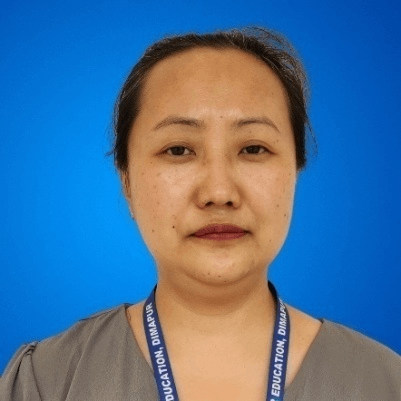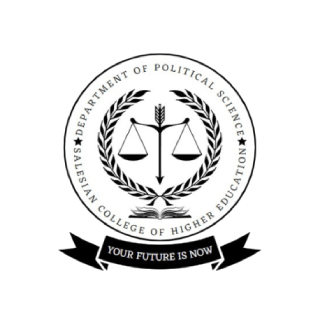MOTTO: YOUR FUTURE IS NOW
VISION: Lead the students towards healthy practices
MISSION: - Enhance the scope of the Department in order to cater to the needs of the students and community
ESTABLISHMENT:
| Degree | Course | Established Year |
|---|---|---|
| UG | BA Political Science | 2015 |
About the Department:
The Department of Political Science, Salesian College of higher Education was established in the year 2015. The Department offers UG degree at BA level, affiliated to Nagaland University. The department helps students develop analytical skills crucial to comprehend contemporary social and political issues.
The Political Science department is a vibrant department where both students and faculties work together cohesively to strengthen and broaden their knowledge base.

Yanvungthung Kikon

Lomi Sema

Vipechalie Belho
ESTABLISHMENT:
| Faculty Recharging Strategies | ||
|---|---|---|
| NAME | QUALIFICATION | ACHIEVEMENT |
| Yanvungthung Kikon | MA, NET | Seminar – 4 Workshop – 8 Conference – 3 |
| Lomi Sema | MA , MPhil, NET | Seminar – 10 Conference – 3 |
| Vipechalie Belho | MA, NET | Seminar – 2 Workshop – 2 Conference - 3 |
DEGREE OFFERED:
| Department | Programme Specific Outcome |
|---|---|
| POLITICAL SCIENCE |
|
Semester – I
| Course Title | Course Outcome | |
|---|---|---|
| 1 | POL- 101 |
Political Theory : Ideas and Concepts Course Outcome
|
| 2 | POL (H) - 102 |
Indian Political Thinkers Course Outcome
|
Semester – II
| Course Title | Course Outcome | |
|---|---|---|
| 1 | POL – 201 |
Political Theory : Ideas and Concepts (B) Course Outcome
|
| 2 | POL (H) - 202 |
Western Political Thought Course Outcome
|
Semester – III
| Course Title | Course Outcome | |
|---|---|---|
| 1 | POL - 301 |
Indian Government and Politics (A) Course Outcome
|
| 2 | POL (H) - 302 |
Western Political Thought Course Outcome
|
Semester – IV
| Course Title | Course Outcome | |
|---|---|---|
| 1 | POL - 401 |
Indian Government and Politics – (B) Course Outcome
|
| 2 | POL (H) - 402 |
International Politics Course Outcome
|
Semester – V
| Course Title | Course Outcome | |
|---|---|---|
| 1 | POL - 501 |
Indian Government and Politics – (B) Course Outcome
|
| 2 | POL (H) - 502 |
Local Self Government In India Course Outcome
|
| 3 | POL (H) - 502 |
International Politics Course Outcome
|
Semester – VI
| Course Title | Course Outcome | |
|---|---|---|
| 1 | POL - 601 |
Public Administration) Course Outcome
|
| 2 | POL (H) - 602 |
Indian Administration Course Outcome
|
| 3 | POL (H) – 604 |
Conflict and Peace Studies Course Outcome
|
FYUGP Course
Semester – I
| Sl. no. | Course Title | Course Outcome |
|---|---|---|
| 1 | POL/H/C-1 - Constitutional Government and Democracy in India |
|
| 2 | POL/H/C-2 - Understanding Political Theory |
|
Semester – II
| Sl. no. | Course Title | Course Outcome |
|---|---|---|
| 1 | POL/H/C-3 - Political Process in India |
|
| 2 | POL/H/C-2 - Understanding Political Theory |
|
Semester – III
| Sl. no. | Course Title | Course Outcome |
|---|---|---|
| 1 | POL/H/C-5 - Introduction to Comparative Government and Politics |
|
| 2 | POL/H/C-6 - Classical Political Philosophy |
|
Semester – IV
| Sl. no. | Course Title | Course Outcome |
|---|---|---|
| 1 | POL/H/C-7 - Perspectives on International Relations and World History |
|
| 2 | POL/H/C-8 - Modern Political Philosophy |
|
Semester – V
| Sl. no. | Course Title | Course Outcome |
|---|---|---|
| 1 | POL/H/C-9 - Perspective on Public Administration |
|
| 2 | POL/H/C-10 - Modern Indian Political Thought-I |
|
| 3 | POL/H/C-11 - Global Politics |
|
Semester – VI
| Sl. no. | Course Title | Course Outcome |
|---|---|---|
| 1 | POL/H/C-12 - Human Rights in a Comparative Perspective |
|
| 2 | POL/H/C-13 - Indian Political Thought-II |
|
| 3 | POL/H/C-14 - Political Processes and Institutions in Comparative Perspective |
|
| 4 | POL/H/C-15 - Public Policy and Administration in India |
|
BEST PRACTICES:
- ● Mentoring
- ● Transparency ensured in evaluating student’s academic performance.
- ● Student centric learning through peer teaching, classroom discussion, PPT presentation etc
- ● Departmental library
- ● Seminars
- ● Field study and departmental tours


